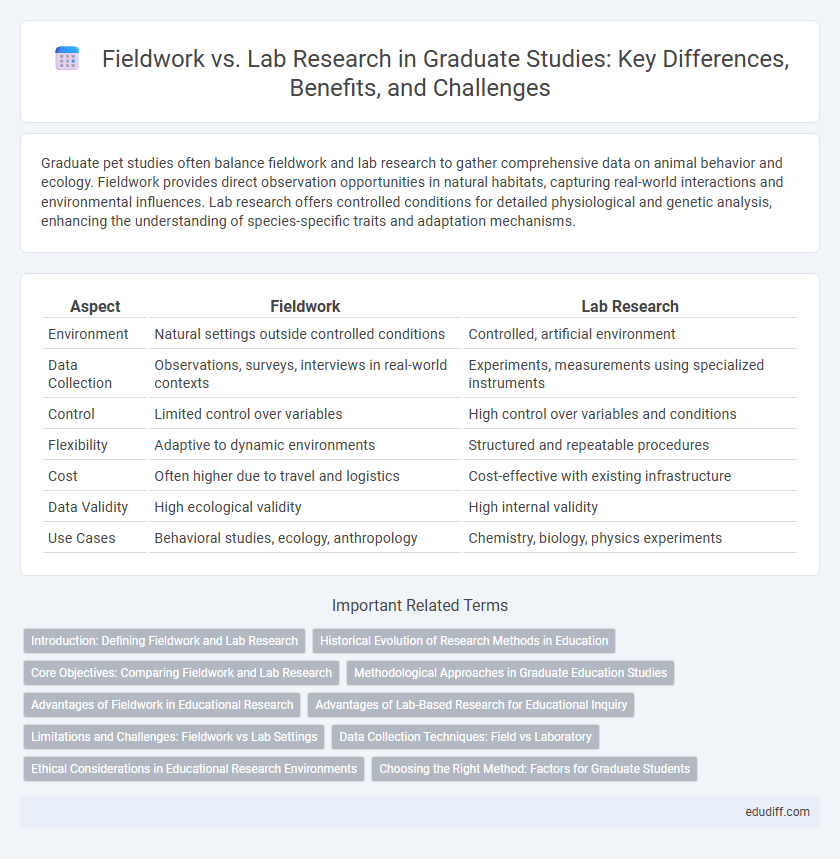Graduate pet studies often balance fieldwork and lab research to gather comprehensive data on animal behavior and ecology. Fieldwork provides direct observation opportunities in natural habitats, capturing real-world interactions and environmental influences. Lab research offers controlled conditions for detailed physiological and genetic analysis, enhancing the understanding of species-specific traits and adaptation mechanisms.
Table of Comparison
| Aspect | Fieldwork | Lab Research |
|---|---|---|
| Environment | Natural settings outside controlled conditions | Controlled, artificial environment |
| Data Collection | Observations, surveys, interviews in real-world contexts | Experiments, measurements using specialized instruments |
| Control | Limited control over variables | High control over variables and conditions |
| Flexibility | Adaptive to dynamic environments | Structured and repeatable procedures |
| Cost | Often higher due to travel and logistics | Cost-effective with existing infrastructure |
| Data Validity | High ecological validity | High internal validity |
| Use Cases | Behavioral studies, ecology, anthropology | Chemistry, biology, physics experiments |
Introduction: Defining Fieldwork and Lab Research
Fieldwork involves collecting primary data directly from natural environments, emphasizing observation and interaction with real-world subjects in their authentic settings. Lab research takes place in controlled environments designed to isolate variables, allowing precise experimentation and replication of results. Both approaches serve distinct purposes in graduate studies, with fieldwork providing ecological validity and lab research ensuring methodological rigor.
Historical Evolution of Research Methods in Education
The historical evolution of research methods in education reveals a dynamic interplay between fieldwork and lab research, each contributing unique insights to the discipline. Fieldwork emphasizes real-world data collection, capturing authentic educational environments, while lab research prioritizes controlled settings to isolate variables and establish causality. Graduate studies increasingly integrate both methodologies to enhance the validity and applicability of educational research findings.
Core Objectives: Comparing Fieldwork and Lab Research
Fieldwork emphasizes collecting real-world, context-specific data to understand natural behaviors and environmental interactions, prioritizing ecological validity and situational analysis. Lab research focuses on controlled experiments to establish causal relationships, ensuring replicability and precision in testing hypotheses. Both methodologies aim to generate reliable knowledge but differ in their approach to control, context, and data authenticity.
Methodological Approaches in Graduate Education Studies
Fieldwork in graduate education studies emphasizes qualitative methodologies such as ethnography, participant observation, and in-depth interviews to capture real-world context and participant perspectives. Lab research prioritizes controlled experimental designs, quantitative data collection, and statistical analysis to establish causal relationships and test hypotheses with precision. Integrating these methodological approaches enhances the robustness of findings and fosters comprehensive understanding in educational research.
Advantages of Fieldwork in Educational Research
Fieldwork in educational research offers direct interaction with real-world learning environments, providing authentic data on student behavior and classroom dynamics that lab research may not capture. This hands-on approach enhances ecological validity and allows researchers to observe natural context, leading to more applicable findings for educational practice. Fieldwork also facilitates the exploration of diverse educational settings, contributing to a richer understanding of varied teaching and learning processes.
Advantages of Lab-Based Research for Educational Inquiry
Lab-based research offers controlled environments that enhance the accuracy and reproducibility of educational experiments, allowing graduate students to isolate variables and test specific hypotheses effectively. Precision instruments and technology in labs facilitate advanced data collection and detailed analysis, improving the reliability of findings in educational inquiry. This structured setting also supports rigorous methodological approaches, ensuring that results contribute valuable insights to pedagogical theories and practices.
Limitations and Challenges: Fieldwork vs Lab Settings
Fieldwork research presents challenges such as uncontrollable environmental variables, logistical constraints, and difficulties in maintaining consistent data collection, whereas lab research offers a controlled setting but may suffer from artificiality and limited ecological validity. Access to natural settings in fieldwork can be hindered by geographical, ethical, and temporal limitations, contrasting with lab studies where sample sizes are often restricted by resource availability. Balancing these limitations requires graduate researchers to carefully design methodologies that optimize data reliability while addressing the inherent trade-offs between external validity and experimental control.
Data Collection Techniques: Field vs Laboratory
Fieldwork data collection techniques prioritize direct interaction with natural environments, utilizing methods such as surveys, observations, and ecological sampling to capture real-world variability and context-dependent phenomena. Laboratory research employs controlled experiments, precise instrumentation, and standardized protocols to isolate variables and ensure reproducibility, emphasizing accuracy and control over environmental factors. The choice between fieldwork and lab techniques significantly influences data reliability, ecological validity, and the generalizability of research findings in graduate-level studies.
Ethical Considerations in Educational Research Environments
Ethical considerations in educational research environments encompass informed consent, confidentiality, and minimizing harm to participants during both fieldwork and lab research. Fieldwork often requires navigating real-world settings, demanding heightened sensitivity to cultural norms and voluntary participation, while lab research allows for controlled conditions but must still ensure privacy and ethical treatment of subjects. Upholding these ethical standards is crucial for maintaining the integrity of graduate-level educational research and protecting participant rights.
Choosing the Right Method: Factors for Graduate Students
Graduate students should consider research objectives, available resources, and data reliability when choosing between fieldwork and lab research. Fieldwork offers real-world data collection and ecological validity, while lab research provides controlled environments for precise experimentation. Balancing these factors ensures the selection of a method aligned with academic goals and practical constraints.
Fieldwork vs Lab Research Infographic

 edudiff.com
edudiff.com